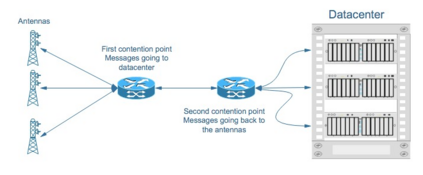Cloud-RAN is a recent architecture for mobile networks where the processing units are located in distant data centers while, until now, they were attached to antennas. The main challenge, to fulfill protocol constraints, is to guarantee low latency for the periodic messages sent from each antenna to its processing unit and back. The problem we address is to find a periodic sending scheme of these messages without contention nor buffering, when all messages are of the same size and the period is fixed. We study the periodic message assignment problem modeling this situation on a common topology, where contention arises from a single link shared by all antennas. The problem is reminiscent of classical scheduling and packing problems, but the periodicity introduces a new twist. We study how the problem behaves with regard to the load of the shared link. The main contributions are polynomial-time algorithms which always find a solution for an arbitrary size of messages and load at most $2/5$ or for messages of size one and load at most $phi - 1$, the golden ratio conjugate. We also prove that a randomized greedy algorithm finds a solution on almost all instances with high probability, explaining why most greedy algorithms work so well in practice.
翻译:云端- RAN 是移动网络的最新结构, 处理器位于遥远的数据中心, 而直到现在, 处理器被连接在天线上。 履行协议约束的主要挑战是如何保证每个天线向处理器和回端发送的定期电文的低潜值。 我们处理的问题是找到这些电文的定期发送方案, 而不引起争议或缓冲, 当所有电文大小相同且时间段固定时。 我们用一个共同的地形学来研究定期信息分配问题, 模拟这种情况, 争议来自所有天线共享的单一链接。 问题在于经典的时间安排和包装问题, 但周期问题带来了新的曲折。 我们研究共享电路的负荷问题。 主要贡献是多时算法, 总是找到任意大小的信息和最多负荷2/5美元, 或大小一号电文的解决方案, 最大负荷为 $phi - 1美元, 金比调调调。 我们还证明随机的贪婪算法在几乎所有情况下都能找到一个解决方案, 并且解释为什么最贪婪的算法工作如此成功。









